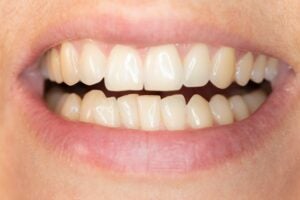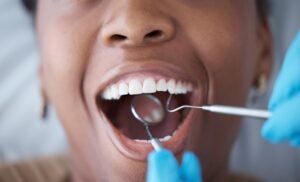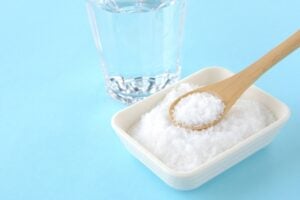-
Reasons Why Your Teeth Misalign
The Prevalence of Misaligned Teeth
 If your teeth are misaligned, you are not alone. In fact, about 90 percent of people have at least a little bit of misalignment. Your crooked teeth could be the result of genetics, childhood habits, injuries, tooth loss, or poor oral hygiene. Understanding the causes of misalignment is the first step towards finding a solution for your misaligned teeth, and possibly averting dental complications.
If your teeth are misaligned, you are not alone. In fact, about 90 percent of people have at least a little bit of misalignment. Your crooked teeth could be the result of genetics, childhood habits, injuries, tooth loss, or poor oral hygiene. Understanding the causes of misalignment is the first step towards finding a solution for your misaligned teeth, and possibly averting dental complications.
Continue reading “Reasons Why Your Teeth Misalign” -
The Connection Between Oral Health and Systemic Diseases
The Impact of Oral Health on Your Overall Health
 For years, scientists have been studying the link between oral health and overall health. While research is still ongoing, there are certain connections that are now well-documented. For example, significant associations have been found between periodontal disease and conditions like diabetes, cardiovascular disease, and kidney disease. The common thread linking these diseases is inflammation, and chronic low-level inflammation contributes to oral issues and issues like heart disease, cancer, and cognitive decline. Understanding these connections underscores how important it is to maintain good oral health, in order to promote overall well-being.
For years, scientists have been studying the link between oral health and overall health. While research is still ongoing, there are certain connections that are now well-documented. For example, significant associations have been found between periodontal disease and conditions like diabetes, cardiovascular disease, and kidney disease. The common thread linking these diseases is inflammation, and chronic low-level inflammation contributes to oral issues and issues like heart disease, cancer, and cognitive decline. Understanding these connections underscores how important it is to maintain good oral health, in order to promote overall well-being.
Continue reading “The Connection Between Oral Health and Systemic Diseases” -
Oral Benefits of Saltwater Rinse
Mouthwash or Saltwater?
 Do you use mouthwash? It is effective in freshening breath and cleaning areas you can’t reach by simply brushing and flossing. However, if you want a rinse that addresses a wider array of oral concerns, a saltwater rinse might be a better bet. Saltwater is known for its healing properties, and rinsing with saltwater can even positively impact your respiratory health. Here, we take a look at the benefits of incorporating a saltwater rinse into your oral health routine.
Do you use mouthwash? It is effective in freshening breath and cleaning areas you can’t reach by simply brushing and flossing. However, if you want a rinse that addresses a wider array of oral concerns, a saltwater rinse might be a better bet. Saltwater is known for its healing properties, and rinsing with saltwater can even positively impact your respiratory health. Here, we take a look at the benefits of incorporating a saltwater rinse into your oral health routine.
Continue reading “Oral Benefits of Saltwater Rinse” -
The Connection Between Snoring and Your Dental Health

Snoring affects millions of people worldwide. While it is often regarded as a minor inconvenience, snoring can sometimes signal underlying health problems, including those related to dental health. Understanding the connection between snoring and dental health can help you deal with the root causes and improve your overall well-being.
Continue reading “The Connection Between Snoring and Your Dental Health”
-
How Improving Your Dental Health Can Make You Happier

Maintaining good dental health is often seen as a fundamental aspect of overall well-being. While the benefits of brushing and flossing are well-known in terms of preventing cavities and gum disease, the positive impact of good oral hygiene extends far beyond just a healthy smile. In fact, improving your dental health can cause you to feel happier and improve your quality of life.
Continue reading “How Improving Your Dental Health Can Make You Happier”
-
What Should You Do After a Root Canal?
What Should You Do After a Root Canal?
A root canal procedure is often essential to relieve pain and save a tooth that has been severely infected or decayed. While the procedure itself can be daunting for many, understanding the root canal recovery process is crucial for ensuring a quick and smooth healing period. This article delves into the best practices and tips for post-root canal care, ensuring that your recovery is as effective and comfortable as possible.
Continue reading “What Should You Do After a Root Canal?”
-
Root Canal Myths Debunked: Is It Considered Oral Surgery?
Clearing Up Concerns About Root Canals
Few dental treatments induce as much anxiety and confusion as root canals. Amidst swirling myths and common misconceptions, one recurring question stands out: Is a root canal oral surgery? Despite common confusion, the simple answer is yes. In this article, we will explore why root canals fall under the category of oral surgery, debunk popular myths surrounding the procedure, and clarify what patients can expect. Continue reading “Root Canal Myths Debunked: Is It Considered Oral Surgery?”
-
Can Root Canals Last a Lifetime?
Root Canals, a Tooth-Saving Procedure
A root canal is a standard dental procedure intended to rescue teeth that have become badly infected or significantly decayed. However, patients often wonder: how long does a root canal last? Understanding the factors that influence the permanence of a root canal and the steps that can be taken to maximize its lifespan is crucial for maintaining oral health and making educated decisions about dental care. Continue reading “Can Root Canals Last a Lifetime?”
-
What’s the Average Age for a Root Canal?
Analyzing the Data
Root canal therapy is a prevalent dental procedure often viewed with apprehension and misconceptions. Many people associate it with pain, but in reality, this treatment is a crucial intervention for saving teeth that are at risk of being lost due to severe infection or decay. Despite its daunting reputation, the procedure itself is a routine part of modern dentistry, designed to relieve pain and preserve the natural tooth. In this article, we will explore the average age at which individuals typically experience their first root canal. By examining who typically needs a root canal and why, we aim to provide insights that alleviate fear and promote better dental health awareness. Continue reading “What’s the Average Age for a Root Canal?”
-
Flu, Allergies, or Tooth Ache?

Woman unsure if she’s experiencing flu, allergy, or tooth ache symptoms.
Seasonal Health Dilemmas
Navigating the murky waters of cold weather ailments, many of us find ourselves puzzled: Is it the flu, allergies, or just a toothache? This confusion is not unfounded, as the symptoms of these conditions often overlap, affecting our oral health in unexpected ways.
The Flu and Oral Health
The common cold and the flu are notorious for causing discomfort beyond just a runny nose or a cough; they can also lead to tooth pain. This is primarily due to the close relationship between our sinuses and oral health. When we’re battling a cold or the flu, the inflammation in our sinuses can exert pressure on our dental nerves, particularly those near the upper teeth, causing a sensation that mimics tooth pain. This phenomenon, often mistaken for dental issues, is actually a side effect of our bodies fighting off the infection.
Medications and Oral Hygiene
Moreover, our oral health can take a hit during illness due to the medications we consume. Decongestants, while relieving nasal congestion, can lead to dry mouth by reducing saliva flow. Saliva is important for washing away food particles and bacteria, protecting our teeth and gums. A decrease in saliva can increase the risk of tooth decay and gum disease, exacerbating the sensation of tooth pain.
Allergies and Tooth Pain
Seasonal allergies compound this issue by affecting our oral cavity. Allergies can lead to sinus congestion and inflammation, putting pressure on our teeth and causing pain, particularly in the upper molars. This pressure is often due to the swelling of the sinus tissues, which, in turn, press against the roots of the teeth. The use of antihistamines, a common remedy for allergies, can also contribute to dry mouth, further increasing the risk of dental discomfort.
Maintaining Oral Health During Illness
Maintaining oral hygiene becomes even more crucial when we’re under the weather. Brushing, flossing, and staying hydrated can mitigate the effects of colds, the flu, and allergies on our oral health. However, distinguishing between a toothache caused by sinus pressure and one resulting from dental issues is essential. If tooth pain persists beyond the illness or is localized to one tooth, it may be time to consult a dentist.
Navigating Oral Health Through Seasonal Challenges
In conclusion, while the flu, allergies, and toothaches may present with similar symptoms, understanding their interconnections can help us better manage our health during these trying times. Regular dental check-ups, along with proper hygiene practices, can go a long way in keeping our teeth and gums healthy, regardless of the seasonal challenges we face.
Need assistance with a toothache?
Park 56 Dental has been the trusted solution in NYC since 1997. Our skilled team offers personalized care, from pediatric to sedation dentistry. Book a complimentary consultation today to address your sensitivity concerns and explore tailored treatment options. Experience comfort and convenience with our modern practice and comprehensive insurance coverage. Schedule your visit online or at 646-679-3973 now and start your journey to a sensitivity-free smile!
RECENT POSTS
categories
- Uncategorized
- Cosmetic Dentistry
- Veneers
- Healthier Teeth
- Teeth Whitening
- Dental Health
- Video
- Dental Emergencies
- Invisalign
- Dental Implants
- Root Canal
- Sedation Dentistry
- Infographic
- Dental Crowns and Bridges
- Dental Anxiety
- Gum Disease
- COVID-19
- Bad Breath
- New York Dentist
- Cut out sugar
- General Dentistry
- Oral Health
- Oral Cancer
- Dry Mouth
- Gum Health
- Toothache
- Dental Sealants
- Cavities



